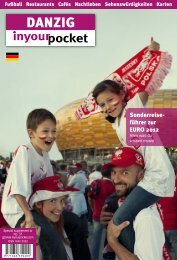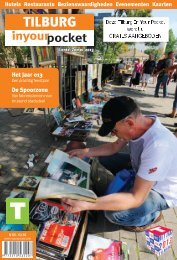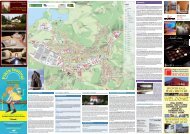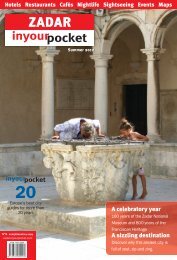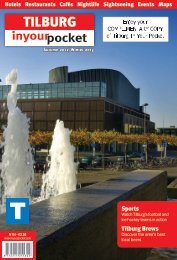7kh 7ul flw\ v prvw dxwkhqwlf 7h[ 0h[ uhvwdxudqw ... - In Your Pocket
7kh 7ul flw\ v prvw dxwkhqwlf 7h[ 0h[ uhvwdxudqw ... - In Your Pocket
7kh 7ul flw\ v prvw dxwkhqwlf 7h[ 0h[ uhvwdxudqw ... - In Your Pocket
Create successful ePaper yourself
Turn your PDF publications into a flip-book with our unique Google optimized e-Paper software.
80 SOLIDARITY<br />
August Accords<br />
1. Acceptance of free trade unions independent of the<br />
Communist Party and of enterprises, in accordance with<br />
convention No. 87 of the <strong>In</strong>ternational Labor Organization<br />
concerning the right to form free trade unions, which<br />
was ratified by the Communist Government of Poland.<br />
2. A guarantee of the right to strike and of the security<br />
of strikers and those aiding them.<br />
3. Compliance with the constitutional guarantee of<br />
freedom of speech, the press and publication, including<br />
freedom for independent publishers, and the availability<br />
of the mass media to representatives of all faiths.<br />
4. A return of former rights to: 1) People dismissed from<br />
work after the 1970 and 1976 strikes, and 2) Students<br />
expelled from school because of their views. The release<br />
of all political prisoners, among them Edward Zadrozynski,<br />
Jan Kozlowski, and Marek Kozlowski. A halt in repression<br />
of the individual because of personal conviction.<br />
5. Availability to the mass media of information about<br />
the formation of the <strong>In</strong>ter-factory Strike Committee and<br />
publication of its demands.<br />
6. The undertaking of actions aimed at bringing the country<br />
out of its crisis situation by the following means: a) making<br />
public complete information about the social-economic<br />
situation, and b) enabling all sectors and social classes to<br />
take part in discussion of the reform programme.<br />
7. Compensation of all workers taking part in the strike<br />
for the period of the strike, with vacation pay from the<br />
Central Council of Trade Unions.<br />
8. An increase in the base pay of each worker by 2,000 złoty<br />
a month as compensation for the recent raise in prices.<br />
9. Guaranteed automatic increases in pay on the basis<br />
of increases in prices and the decline in real income.<br />
10. A full supply of food products for the domestic<br />
market, with exports limited to surpluses.<br />
11. The abolition of ‘commercial‘ prices and of other<br />
sales for hard currency in special shops.<br />
12. The selection of management personnel on the basis<br />
of qualifications, not party membership. Privileges of<br />
the secret police, regular police and party apparatus are<br />
to be eliminated by equalizing family subsidies, abolishing<br />
special stores, etc.<br />
13. The introduction of food coupons for meat and meat<br />
products (during the period in which control of the market<br />
situation is regained).<br />
14. Reduction in the age for retirement for women to 50 and<br />
for men to 55, or after 30 years‘ employment in Poland for<br />
women and 35 years for men, regardless of age.<br />
15. Conformity of old-age pensions and annuities with<br />
what has actually been paid in.<br />
16. Improvements in the working conditions of the health<br />
service to insure full medical care for workers.<br />
17. Assurances of a reasonable number of places in<br />
day-care centers and kindergartens for the children of<br />
working mothers.<br />
18. Paid maternity leave for three years.<br />
19. A decrease in the waiting period for apartments.<br />
20. An increase in the commuter‘s allowance to 100<br />
złoty from 40, with a supplemental benefit on separation.<br />
21. A day of rest on Saturday. Workers in the brigade<br />
system or round-the-clock jobs are to be compensated<br />
for the loss of free Saturdays with an increased leave or<br />
other paid time off.<br />
Alojzy Tomaszewski<br />
Although Solidarity was officially christened in 1980, its roots<br />
can be traced some ten years earlier. Protesting against<br />
plunging living standards workers at the Lenin Shipyards<br />
called a strike, with the army promptly called in to intervene.<br />
Bloody clashes led to the deaths of 45 people, and ultimately<br />
forced Wladyslaw Gormulka out of power. Replaced by Edward<br />
Gierek, his half-mad economic policies served to create<br />
an illusion of prosperity, as well as generating a flush of jobs<br />
in Gdansk’s Nowy Port area. But the memory of 1970 did not<br />
fade and Gdansk remained a ticking bomb for the authorities.<br />
With the seventies drawing to a close tensions started to<br />
rise again, with living standards falling and the economy in<br />
huge debt built on massive foreign loans.<br />
<strong>In</strong> August, 1980 the dismissal of a female crane operator at<br />
Gdansk’s Lenin Shipyards provided the spark for workers to<br />
go on strike. Workers already disillusioned with price increases<br />
and the falling value of their salaries were ready to take action.<br />
Lech Walesa and other activists were already planning strike<br />
action but it soon became clear that momentum within the<br />
yard was growing quickly and it was this that spurred Walesa<br />
to famously scale the wall of the Lenin shipyard to take control.<br />
Walesa with his trademark sharp trading managed to steer<br />
his colleagues away from mere wage demands towards the<br />
idea of creating a trade union movement to represent the<br />
workers and to fight injustice. This time the workers learned<br />
from the mistakes of 1970 and did not confront the authorities<br />
but instead locked themselves into the shipyards. Three days<br />
later leaders representing workers from over 150 industrial<br />
plants met in the shipyards to hammer out 21 demands,<br />
including the legalisation of independent trade unions. Days<br />
of tension followed, with tanks and armed units stationed<br />
menacingly outside the gates of the shipyards. On August<br />
31 the government backed down, agreeing to meet the 21<br />
demands - thereby marking the first peaceful victory over<br />
communism. A month later, on September 22, delegates<br />
from 36 regional unions met in Gdansk forming a coalition<br />
under the name of Solidarity. Lech Walesa, the unlikely hero<br />
of August, was elected as chairman. The next few months<br />
marked a golden period for the nation; some ten million people<br />
joined the Solidarity movement, and Poland enjoyed a freedom<br />
unknown for decades.<br />
Riding the crest of a wave Solidarity continued to lobby for<br />
further reforms and free elections, infuriating the Kremlin.<br />
With Soviet invasion a looming threat the Polish President,<br />
General Jaruzelski, declared a state of martial law on December<br />
13, 1981, and tanks once again rolled through the<br />
streets. Though Solidarity was officially dissolved, and its<br />
leaders imprisoned, it continued to operate underground.<br />
When Father Jerzy Popieluszko, Solidarity’s chaplain, was<br />
abducted and murdered by the secret police over a million<br />
people attended his funeral.<br />
Gdańsk <strong>In</strong> <strong>Your</strong> <strong>Pocket</strong> gdansk.inyourpocket.com<br />
Fot. Erazm Ciołek<br />
Renewed labour strikes and a faltering economy forced<br />
Jaruzelski into initiating talks with opposition figures in<br />
1988, and the following year Solidarity was once again<br />
granted legal status. Participating in Poland’s first<br />
post-communist election the party swept to victory,<br />
with Wałęsa leading from the front. <strong>In</strong> spite of overseeing<br />
Poland’s transition to a market economy, Solidarity<br />
gradually found their power being eroded by the emergence<br />
of fresher political parties.<br />
The 2000 elections for the Sejm (lower parliament) sounded<br />
the death knell for the party. Failing to even make the<br />
minimum vote to qualify for representation in parliament, the<br />
party which changed history found itself essentially vanishing<br />
from the political map.<br />
European Solidarity Center<br />
(Europejskie Centrum<br />
Solidarności) B-1, ul. Doki 1,<br />
tel. (+48) 58 767 79 71, www.<br />
ecs.gda.pl. The boom in interest<br />
in the Solidarity years has been<br />
met with the news that a European<br />
Solidarity Centre is to be built in<br />
Gdańsk. Due to be completed<br />
by October 2013, the project will<br />
incorporate conference rooms,<br />
restaurant, the Roads to Freedom exhibition, a library, archive<br />
material and a large number of educational activities. The idea<br />
is simple: to promote democracy and independence, as well as<br />
maintain contacts with human rights organisations. Situated<br />
next to Solidarity Square next to the famous Gate #2 and the<br />
BHP Hall where the famous accords were signed, it will also be<br />
the setting for Lech Wałęsa’s and the Solidarity Foundation’s<br />
new offices. QOpen 08:00 - 16:00. Closed Sat, Sun.<br />
gdansk.inyourpocket.com<br />
HISTORY<br />
ART<br />
MULTIMEDIA<br />
Open Oct - Apr from 10:00 - 17:00<br />
May - Sept from 10:00 - 18:00<br />
Closed every Monday<br />
24 Wały Piastowskie Street, Gdańsk<br />
(accessed via street entrance)<br />
tel. +48 58 308 44 28, fax +48 58 308 43 09<br />
EUROPEAN SOLIDARITY CENTRE<br />
www.ecs.gda.pl www.fcs.org.pl<br />
SOLIDARITY<br />
Monument of the Fallen Shipyard Workers (Pomnik<br />
Poległych Stoczniowców) B-1, Pl. Solidarności. Lying<br />
right outside famous gate no. 2 to the Gdańsk Shipyards<br />
(formally the Lenin Shipyards) the monument was unveiled in<br />
1980 to commemorate the events of 1970 when 45 people died<br />
during street riots protesting against the communist regime.<br />
The right to erect this memorial was one of Solidarity’s main<br />
demands during the 1980 lock-in. The 42-metre, 139-tonne<br />
steel sculpture stands on the spot where the first three victims<br />
of the 1970 riots were killed. There are three crosses<br />
to represent the three victims and the crosses themselves<br />
signify the suffering and sacrifice of all the protestors.<br />
Lech Wałęsa referred to this enormous steel structure as ‘a<br />
harpoon driven through the body of a whale. No matter how<br />
hard the whale struggles, it can never get rid of it.’<br />
The monument is marked by a poignant inscription by<br />
Czesław Miłosz: ‘You who have harmed simple man, mocking<br />
him with your laughter, you kill him, someone else will be born,<br />
and your deeds and words will be written down’.<br />
Surrounding the monument are several memorials and<br />
plaques dedicated to victims of totalitarianism and the<br />
(under-construction) European Solidarity Centre.<br />
Other points of interest<br />
The church played its part in the fall of communism, with many<br />
citing John Paul II’s visit to Poland in 1978 as a key date in Polish<br />
patriotism. <strong>In</strong> the period of martial law Gdańsk’s St Bridget’s<br />
church was used as a sanctuary by leaders of the movement,<br />
as was the enormous St Mary’s. Close to the train station the<br />
new town hall (next to Bastion Św. Elżbiety) was once home to the<br />
legendary student club, Żak - a hotbed of anti-establishment thinking.<br />
This was the site of pro-democracy rallies in 1981, and most<br />
recently it served as Lech Walesa’s temporary office. Nowadays<br />
Wałęsa can be found holding court inside the Green Gate building.<br />
May - July 2012<br />
81



